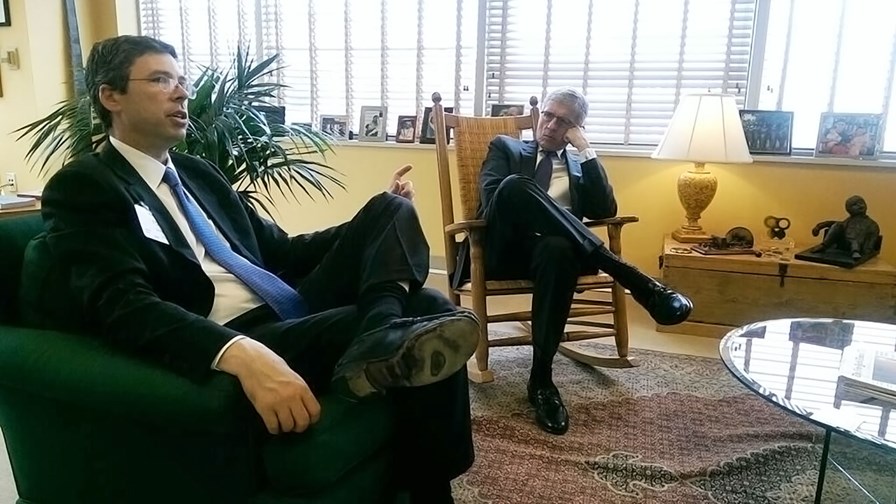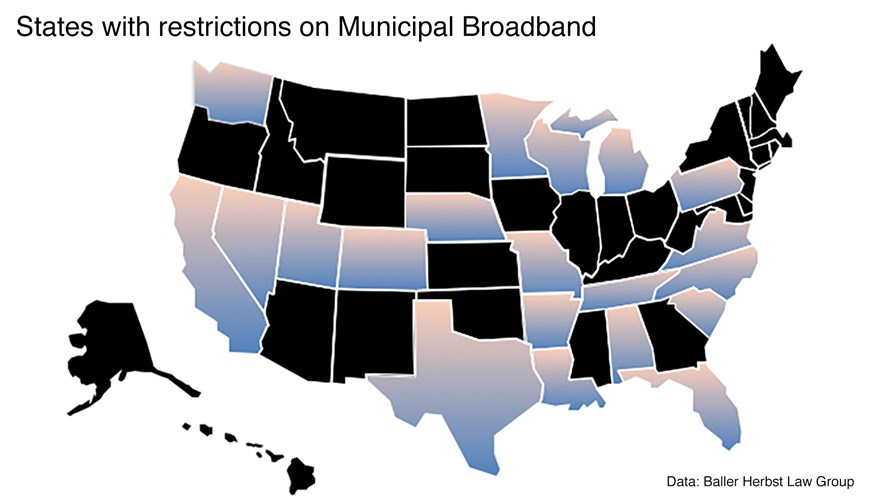
© GigiBSohnFCC via Twitter
US municipal broadband, or community broadband as the regulator FCC puts it, is an utter mess. Long-time TelecomTV viewers will have seen my series of reports from the US about broadband as part of our Connected States series (with the new site migration, we’ll soon be making these available again). We reported on several valiant efforts to bring usable broadband to communities hitherto deprived by the major national operators.
The one beacon of hope appeared to be the city of Chattanooga in Tennessee. Thanks to forward thinking from the local politicians and regional power company EPB, Chattanooga rolled out its own gigabit broadband service and – judging by the economic decline in neighbouring communities – managed to reinvent the city as business location fit for the connected society.
It appears that the FCC has finally realised that Chattanooga can offer many lessons to the thorny problem of community broadband.
FCC chairman Tom Wheeler met the mayor of Chattanooga, Andy Berke, this week to better understand the role of broadband in the transformation of the city. Writing on his blog, Wheeler said that: “if any city understands the power of networks to drive economic growth, it’s Chattanooga, Tennessee.”
The former railroad town became a major industrial centre in the late 19th century and early twentieth. But as with most industrial centres in developed nations, the global economy soon ended this period of prosperity. When the city decided to turn its focus to the new digital economies, it found that its infrastructure was lacking and that timely improvements were not going to be forthcoming. So it decided to roll its own. Forget past associations with ‘the Chattanooga Choo-Choo’, its new moniker is ‘the Gig City’.
But as Tom Wheeler says in this tweet:
Chattanooga is poster child for benefits of community bband networks & also prime example of efforts to restrict them http://t.co/dn3jGR4tlw
— Tom Wheeler (@TomWheelerFCC) June 11, 2014
Whilst neighbouring communities want to join and be part of an extended gigabit network, they are prohibited by state legislature. No further geographic growth is currently possible. And so they are left to the whims of the telcos and cable cos: “Commercial broadband providers can pick and choose who to serve based on whether there is an economic case for it,” wrote Wheeler.
He goes further, and gets to the heart of the matter, when he adds: “If the people, acting through their elected local governments, want to pursue competitive community broadband, they shouldn’t be stopped by state laws promoted by cable and telephone companies that don’t want that competition.”
And so Wheeler wants the FCC to exercise its power to pre-empt state laws that ban or restrict competition from community broadband. “Competition works – when it is allowed to,” he wrote. “Throughout the country where we have seen competitive broadband providers come in to a market, prices have gone down and broadband speeds have gone up. No wonder incumbent broadband providers want to legislate rather than innovate.”
Removing restrictions on community broadband should enable the expansion of high-speed Internet access in underserved areas, spurring economic growth. The FCC is sure to have a fight on its hands if they want to turn years of talk into action. First step; start pre-emption proceedings – but so far, despite Wheeler first raising the matter in February, there’s no evidence of when this will happen.

© TTV / Baller Herbst
James Baller of DC-based law firm Baller Herbst is a long-term advocate for municipal broadband. His latest list of state restriction can be downloaded here, and is summarised below:
- Alabama: imposes numerous restrictions that collectively make it very difficult for municipalities to take advantage of this authority.
- Arkansas: only municipalities that operate electric utilities can provide telecoms services, but expressly prohibits them from providing local exchange services.
- California: generally allows public entities to provide services, but Community Service Districts can only offer services as long as no private person is willing to do so.
- Colorado: requires municipalities to hold a referendum before doing so, unless the community is unserved and the incumbents have refused to provide the services.
- Florida: imposes price-raising taxes on municipal telecoms services and subjects municipalities to requirements that make it difficult for capital intensive initiatives, such as FTTH.
- Louisiana: requires municipalities to hold a referendum.
- Michigan: permits public entities to provide telecoms services only if they have first requested bids for the services and have received less than three qualified bids.
- Minnesota: requires municipalities to obtain a majority of 65% of voters before providing local exchange services or facilities.
- Missouri: bars municipalities and municipal electric utilities from selling or leasing telecoms services to the public.
- Nebraska: only public power utilities can provide wholesale or retail broadband, Internet, telecommunications or cable service.
- Nevada: prohibits municipalities with populations of 25,000 or more and counties with populations of 50,000 or more from providing telecoms services.
- North Carolina: imposes numerous requirements that collectively have the practical effect of prohibiting public communications initiatives.
- Pennsylvania: prohibits municipalities from providing broadband services to the public for a fee unless such services are not provided by the local telephone company.
- South Carolina: imposes significant restrictions and burdensome procedural requirements on governmental providers of telecoms.
- Tennessee: allows municipalities that operate their own electric utilities to provide telecoms services but only upon complying with various requirements.
- Texas: prohibits municipalities and municipal electric utilities from offering telecoms services to the public either directly or indirectly.
- Utah: imposes numerous burdensome procedural and accounting requirements on municipalities that wish to provide services directly to retail customers.
- Virginia: effectively prohibits municipalities from providing triple play services by effectively banning municipal cable service.
- Washington: authorizes some municipalities to provide telecoms services but prohibits public utility districts from providing services directly to customers.
- Wisconsin: requires municipalities to conduct a feasibility study and hold a public hearing prior to providing telecoms services.
Email Newsletters
Sign up to receive TelecomTV's top news and videos, plus exclusive subscriber-only content direct to your inbox.




